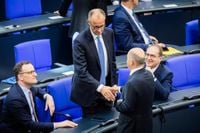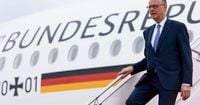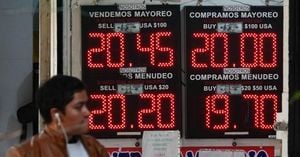Friedrich Merz has officially taken office as the Chancellor of the Federal Republic of Germany, following his election by the Bundestag on May 6, 2025. In a surprising turn of events, Merz, the leader of the Christian Democratic Union (CDU), was elected in a second ballot after failing to secure the required majority in the first round. He garnered 325 votes, surpassing the necessary 316 votes for confirmation in the 630-seat parliament. The CDU/CSU and SPD coalition factions hold a total of 328 seats, with 618 members participating in the voting process.
Merz's election marks a significant moment in German politics, as he becomes the tenth chancellor of the postwar era and the sixth from the CDU. His cabinet reflects a commitment to gender balance, comprising ten men and eight women, with both the CDU and SPD contributing seven ministers each, while the Christian Social Union (CSU) provides three.
After receiving his certificate of appointment from Federal President Frank-Walter Steinmeier, Merz was sworn in during a formal ceremony in the Bundestag. His first day in office includes a planned visit to France and Poland, where he aims to strengthen Germany's ties with its key European allies.
During his inaugural trip, Merz emphasized the need for European unity in addressing pressing global issues, including the ongoing war in Ukraine. At a press conference with French President Emmanuel Macron in Paris, he stated, "We cannot end this war in Ukraine without a continued involvement of the United States of America; this is not something that Europeans can substitute for." He highlighted that any future ceasefire and security guarantees for Ukraine would necessitate US engagement.
As part of the discussions, Merz and Macron announced the establishment of a Franco-German Defense and Security Council, which aims to enhance operational responses to shared strategic challenges. Merz stressed that all EU member states must increase their defense spending to collectively support Ukraine and close capability gaps within the alliance.
In light of the recent Russian announcement of a three-day ceasefire from May 8 to 10, Merz expressed skepticism regarding Moscow's commitment to peace, echoing Macron's concerns about Russia's track record of respecting ceasefire agreements. "Beyond the three days promised, which will undoubtedly not be respected, like the previous ones, is the Russian president finally serious?" Macron questioned.
In addition to defense matters, Merz's government is also focused on migration policies. He intends to tighten regulations further by rejecting asylum seekers at land borders, a move that has sparked debate regarding the balance between security and humanitarian obligations.
On the domestic front, the new Foreign Minister Johann Wadephul emphasized the significance of Merz's initial visits to France and Poland, stating the importance of re-establishing the Franco-German axis. Wadephul pointed out that the ongoing conflict in Ukraine represents a significant challenge for Europe, necessitating a unified response.
Merz's election follows a tumultuous period in German politics, where the previous coalition government disbanded at the end of 2024. Observers noted the fragility of coalition partnerships, as Merz's inability to secure a majority in the first ballot raised questions about the stability of his administration. Despite having sufficient votes to win, the first round's failure was unprecedented in Germany's postwar history, prompting discussions about the future of the coalition.
Compounding the challenges faced by the new chancellor is the geopolitical landscape. Merz's government is tasked with navigating the complexities of transatlantic relations, particularly in light of US President Donald Trump's administration, which has shifted its focus away from being the primary guarantor of European security. Merz has publicly called for an end to US interference in German politics, urging the American government to respect Germany's sovereignty in domestic affairs.
In a recent interview, Merz stated, "I did not interfere in the American election campaign and take sides for one or the other. I would like to encourage and exhort the American government to leave German domestic politics to Germany and to largely stay out of these partisan considerations." His remarks come in the wake of the far-right Alternative for Germany (AfD) party receiving support from high-ranking members of Trump’s Cabinet following its classification as a "proven" extremist organization by Germany's federal domestic intelligence agency.
As Merz embarks on his chancellorship, he faces a multitude of challenges, including a struggling economy and rising far-right populism within Germany. His administration's success will rely heavily on its ability to foster unity within Europe and effectively address the pressing issues of security, migration, and economic stability.
In conclusion, Friedrich Merz's ascension to the chancellorship represents a pivotal moment for Germany and Europe. His immediate focus on strengthening alliances and addressing security challenges reflects the urgent need for cohesive leadership in a time of uncertainty. As he navigates the complexities of both domestic and international politics, Merz's actions will be closely scrutinized by observers eager to see how his government will shape the future of Germany and its role on the global stage.





